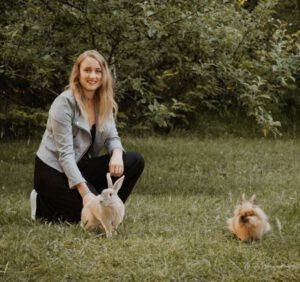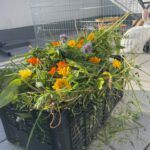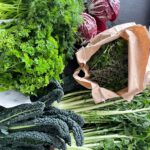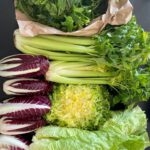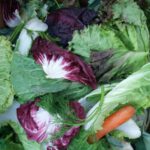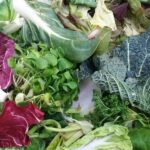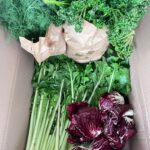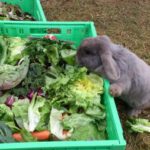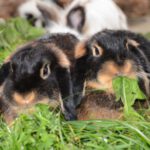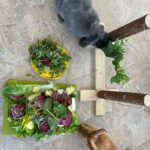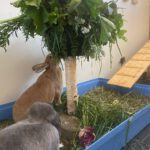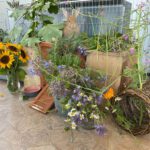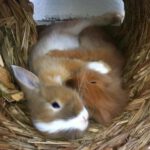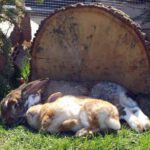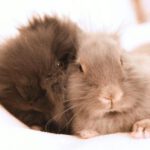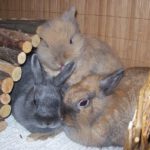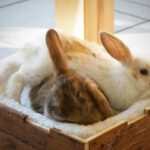Winter Feeding – The Right Mix is Key
Few seasons cause as much debate among rabbit owners as winter. It’s not just the housing and cold protection that leave some rabbit owners uncertain when temperatures drop, but also the diet, as nature seems to offer significantly fewer food sources in winter compared to summer. So, what should rabbits eat during the snowy season to stay healthy throughout the winter?
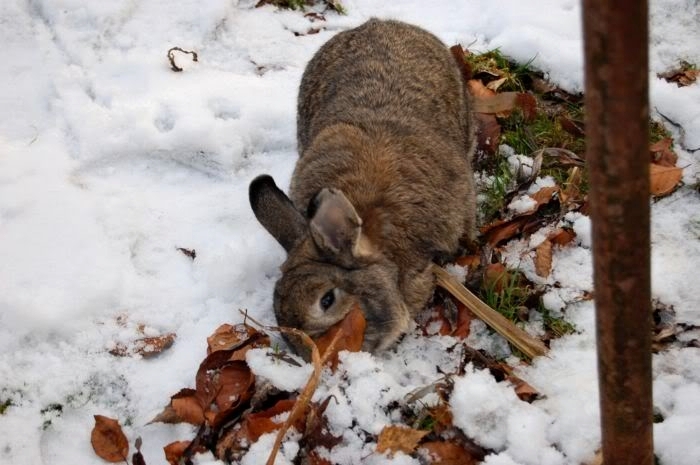
Isn’t winter also a time of scarcity in nature?
It is often said that wild rabbits only eat „hay“ or „meager food“ in winter, but this is not entirely accurate. Most of the winter (depending on the region) is snow-free, meaning rabbits have continuous access to fresh food, which they nibble on. When snow falls, they dig and scratch for fresh food beneath it. Areas that remain snow-covered for long periods are not inhabited by wild rabbits, even though rabbits are very adaptable and can live almost anywhere.
Those who keep free-range rabbits with access to nature and its winter variety know that they behave similarly to their wild relatives. They dig numerous holes in the snow to uncover the grass underneath and eat it. They also dig up sloes, acorns, and other fruits that have fallen from autumn and are buried under the snow, and eat them. They chew on the bark of trees and nibble on any leftover autumn leaves under the bushes. Wild rabbits do the same. While some meadow plants may be brown in winter, if you look closely, you can still find many fresh, green plants, such as plantain, dandelion, and grasses.

Of course, digging for food is quite demanding and requires a lot of energy, which is why many wild rabbits lose weight in winter. When snow cover persists for too long during harsh winters, many wild rabbits die from exhaustion, lack of food, and disease. Mortality is generally high in nature during the winter. This is a natural process, as only the strongest survive (and reproduce in the spring > natural selection). However, this effect is undesirable in pet care. We want all our rabbits to be properly cared for, with none of them becoming weakened. In pet care, we don’t rely on natural selection through difficult times. That’s why we feed our pet rabbits a varied and healthy diet even in winter. We want our house rabbits to stay healthy and live long lives, while wild rabbits typically only live to around two years of age.
By the way, wild rabbits don’t eat hay in winter. If you know any wild rabbits in your area, try placing a pile of hay and observe whether they go to it. They will usually ignore it. This is because the meager food that wild rabbits find in winter (plant remnants under the snow, roots, bark…) is still more nutritious than hay. In nature, there is no hay in winter, only plenty of fresh greens and bark.
What do my pet rabbits need in winter?
The winter diet of rabbits should always consist of various components to ensure their nutritional needs are fully met.
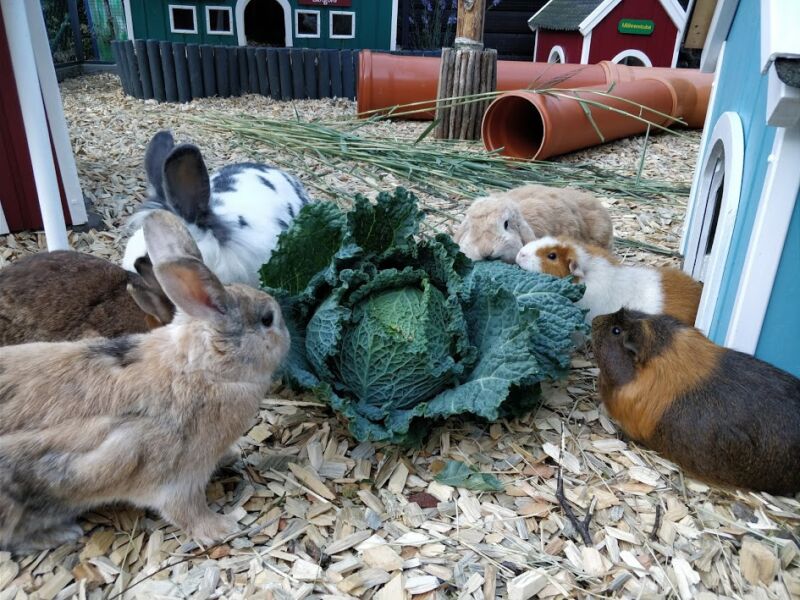
Main food: Green and fresh food
It is crucial to provide an adequate supply of fresh greens during the winter. Although there may be little to forage outdoors in winter, rabbits should still be given a good amount of fresh greens every day. As long as there is something available outdoors, it should be used. You can also place whole cabbage or lettuce heads in the enclosure.
Leafy vegetables should make up at least 80% of the daily fresh food portion, while root vegetables such as carrots should only be given in small amounts.
Always provide enough food so that there are leftovers for the next meal. The rabbits don’t need to finish their favorite food by the next feeding, but there should always be leafy greens available!
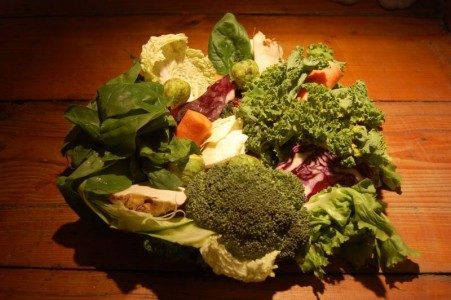
Cabbage vegetables are particularly suitable for winter feeding. Despite their poor reputation, they are essential and very healthy for winter nutrition. Popular options include kohlrabi leaves, kale, savoy cabbage, broccoli, pointed cabbage, and cauliflower. Other types of cabbage can also be offered. However, cabbage should not be fed alongside commercial dry food, which should be eliminated beforehand. Cabbage must be introduced slowly—never offer a large amount at once. Once the rabbits are accustomed to it, whole cabbage heads can be placed in the enclosure. Cabbage can withstand frost, meaning its cells are not destroyed, and it retains its structure. This is why rabbits will eat it both frozen and after it has thawed.
Among lettuces, those with bitter compounds, such as endive, frisée, and chicory, are especially beneficial. Dandelion greens can often be found in Turkish stores as a type of salad.
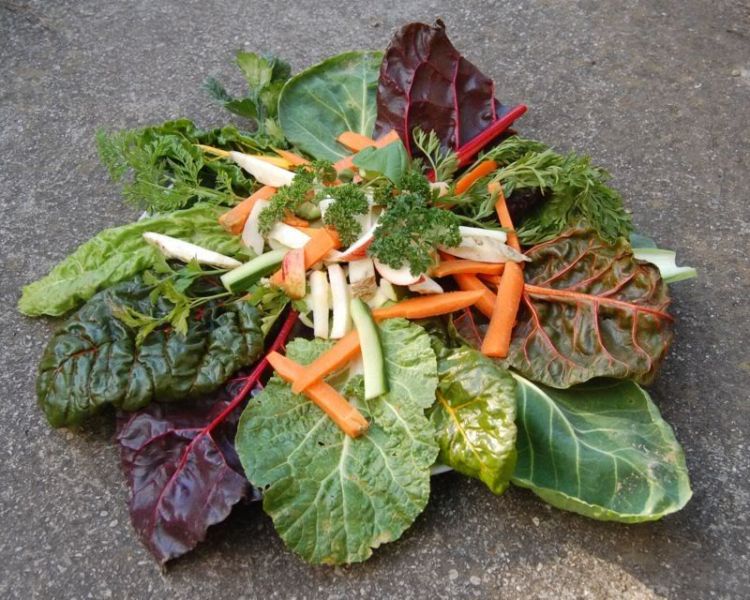
Herbs may be expensive but are very valuable for rabbit nutrition. All herbs that are safe for human consumption are also safe for rabbits.
Vegetable greens, such as carrot tops, celery stalks, kohlrabi leaves, and cauliflower leaves, are ideal.
Other leafy vegetables, such as various types of lettuce and spinach, can also be fed in small amounts.
In addition, small amounts of root and tuber vegetables can be offered, such as carrots, parsnips, beets, parsley root, celeriac, rutabaga, turnips, fennel, and Jerusalem artichokes. These should always make up a small portion of their diet.
Leafy Vegetables: Main food, should make up at least 80% of the diet.
| Bitter Lettuces Feed in large quantities. They contain bitter substances that aid digestion and prevent overweight. | Examples include endive (smooth and curly), escarole, radicchio, chicory, Brussels chicory, smooth escarole, dandelion. |
| Leafy Cabbage After a slow introduction, feed in large quantities. Contains a lot of protein and spicy substances that keep the respiratory and urinary systems healthy, providing energy for the winter. | Examples include kale, savoy cabbage, pointed cabbage, kohlrabi leaves, black cabbage, cauliflower leaves, white cabbage, Brussels sprouts, Chinese cabbage, arugula. |
| Leafy Vegetables The high fiber content is good for digestion and contains a variety of secondary phytochemicals. | Examples include carrot tops, celeriac leaves, celery, fennel leaves, beet leaves, radish leaves. |
| Aromatic herbs All herbs are suitable. The essential oils they contain keep the digestive and respiratory systems healthy, providing energy for the winter. | Examples include basil, dill, parsley, lemon balm, mint, rosemary, oregano, sage, thyme, marjoram, tarragon, cilantro, wormwood. |
| Other Leafy Vegetables Yes, these can be fed every day in small amounts as a supplement. | Examples include lamb’s lettuce (Mâche), purslane, Lollo Rosso lettuce, Lollo Bionda lettuce, oak leaf lettuce, Romaine lettuce. |
| Less Suitable Leafy Vegetables Feed infrequently and in small amounts. | Examples include iceberg lettuce, Swiss chard, spinach. |
Solid Vegetables: Supplementary food, should make up no more than 15% of the diet.
| Solid Cabbages: | Turnip, broccoli, cauliflower, romanesco, pak choi |
| Root Vegetables or Tubers: | Carrots, parsnips, beets, parsley root, celeriac, turnip, Jerusalem artichoke, fennel |
| Other Solid Vegetables: | Add in small amounts – Cucumber, tomato, pumpkin, zucchini, bell pepper |
| Fruits | Only as a treat, the amount should be about the size of a nail – Apple, pear, quince, plum |
R
What can I do if fresh food freezes?
Frost destroys the cells in fresh food, which makes it unappealing to rabbits and can be harmful to their digestion. Rabbits instinctively avoid frozen or thawed fresh food unless they are truly hungry.
Cabbage, however, contains a natural antifreeze that prevents the cells from breaking down. Some varieties of cabbage are intentionally allowed to freeze before harvest because this enhances their sweetness. Cabbage can be fed both frozen and after thawing.
Grass, pine, and spruce branches, as well as green manure from the wild, are also resistant to frost and can be fed even in freezing temperatures.
For light frost, it’s usually enough to offer fresh food more often, in a sheltered area, on a thick layer of dry straw. As a backup, you can place cabbage heads in the shelter. If other fresh food freezes, the rabbits can eat the cabbage.
In case of more severe frost, the above methods may not be sufficient. If you have access to electricity near the enclosure, you can take the following steps:
Without electricity: Offer smaller portions of bitter lettuces, kitchen herbs, and small amounts of root vegetables more frequently, placing them in the shelter on a thick layer of straw. If you can’t supplement food as often, consider placing a microwaveable heat pad underneath. As a backup, you can place cabbage heads in the shelter. If other fresh food freezes, the rabbits can eat the cabbage. Hay should always be available.
With electricity: Heat sources make it easier to care for rabbits during severe frost, as they will often seek out warm places to lie. Fresh food can be placed directly under the heat source. If you have a large shelter, you can use a heat lamp. Common heating options include heating mats, heated shelters, and heat plates. Make sure to secure any cables to prevent the rabbits from chewing on them—this can be done by covering cables with a stone slab or surrounding them with wire mesh. Materials that can be chewed should not be used around rabbits that tend to chew on everything.
Rabbits eat less during cold weather!
It’s normal for rabbits to eat less in cold weather and to consume more dry food (hay, dried greens). As long as they remain healthy and continue eating, there’s no need to worry.
Good roughage is essential
In winter, ensure your rabbits always have access to good-quality hay. The hay should be tasty, dry, mold-free, green, and diverse. It should not be too old or overly rich in herbs. Be sure to replace the hay daily, even if it hasn’t been eaten. Only about 50% of hay is eaten by rabbits, and hay that has been stored too long in the enclosure can lose its quality.
In addition to high-quality hay, some owners offer dried herbs. However, it’s generally better to avoid them, as they are often given in excess. Even one tablespoon per day per rabbit can disrupt the digestive system, encouraging the growth of harmful bacteria. Dried herbs can also cause weight gain and lead to bladder issues. If you still want to feed them, offer very small amounts. A good rule of thumb is to give up to one tablespoon for two rabbits, once or twice a week. They can also be sprinkled on top of hay or offered as a treat by hand.
Supplementary Food
A key energy source in winter is fruit, particularly local varieties such as apples and pears. These can be offered regularly in small amounts by hand. During very cold weather (below -10°C) or for larger rabbit breeds, they can even be offered for several consecutive days, as long as they are well tolerated (keep an eye on their poop).
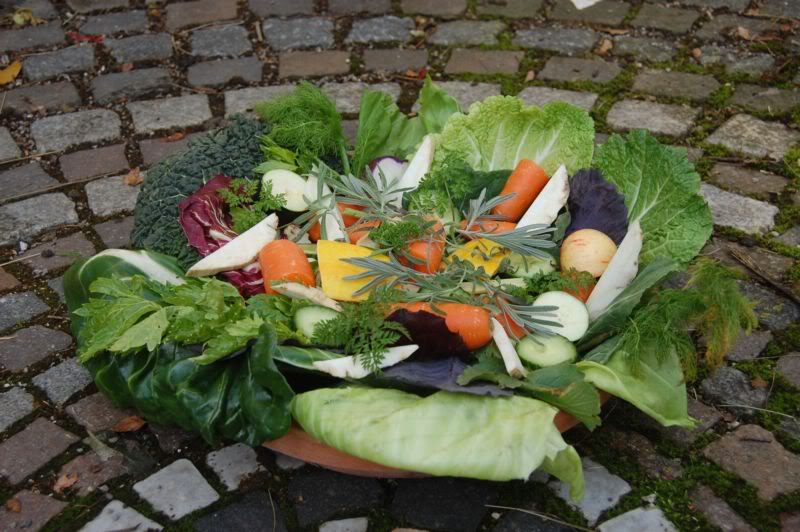
Do rabbits need energy food in winter?
Most rabbits do not need energy-rich food!
Almost all commercial dry foods are completely unsuitable, as they can harm the rabbits‘ teeth and digestive system.
Mash is a better option than dry food because it is less dry. Dry food can also be transformed into mash. More information on this can be found here.
If you feel the need to offer something dry, dried herbs (such as grass cobs, hay balls, dried grass, premium hay balls, etc.) are the best choice. These have a much higher vitamin and protein content, making them of higher quality and more popular than hay. Unfortunately, they are often only available in large quantities and regionally, or you can order them loose from suppliers like „Hasenhaus“ in the Odenwald. Dried herbs are not suitable for rabbits with bladder sludge or those that are overweight.
Fresh Greens in Winter
Even in winter, rabbits need a varied diet. It’s important to offer fresh greens as well. There are many ways to do this.
Sprouts
A valuable nutrient source in winter is sprouts, i.e., germinated seeds, which are best sprouted using a sprouting jar. Among seeds, wheat and rye sprouts are particularly high in vitamin E. However, all sprouts provide excellent nutrients.
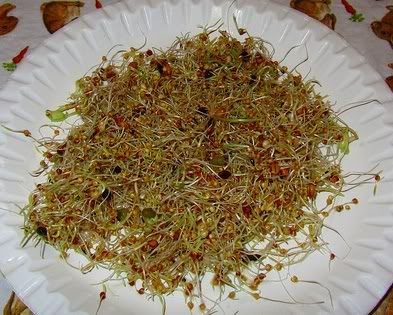
Vitamin E content in µg per 100g of sprouts
Wheat sprouts: 24,735 µg
Rye sprouts: 12,600 µg
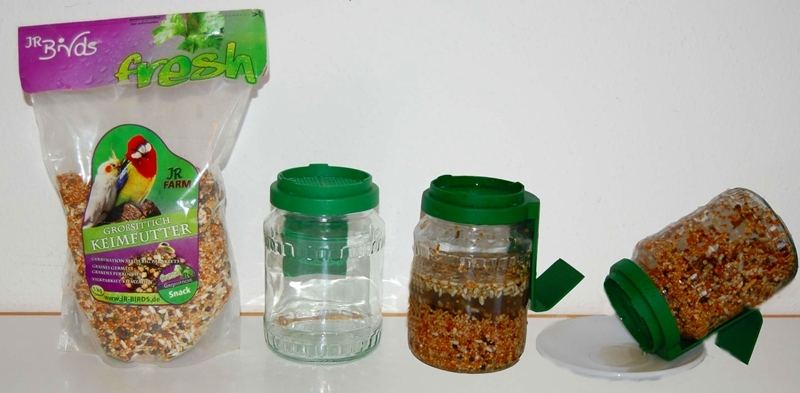
JR Farm Sprouting Seeds (for Parrots or Budgies)
When seeds are sprouted, their nutrient content becomes more accessible, their water content increases, and they provide fresh greens for the rabbits. Therefore, sprouted seeds are always a great supplement to a rabbit’s diet, especially in winter.
You will need: Seeds, a sieve, and a bowl to place the sieve in (a sprouting jar can be used instead of the sieve and bowl).
Instructions:
Place the seeds into the sieve (note: do not use flax seeds, as they are unsuitable! JR-Farm sprouting seeds germinate particularly well). Rinse the seeds briefly under running water, then place the sieve into the bowl. Fill the bowl with water and let it sit for 8 hours. After 8 hours, drain the water from the bowl, rinse the seeds again in the sieve, and return the sieve to the empty bowl. Rinse the seeds twice daily under running water, and leave them in the bowl without any water in between rinses. Once the seeds have sprouted, they are ready to be fed to the rabbits.
Green Manure
A cost-effective and healthy diet for rabbits can be achieved with green manure, which grows in fields and can be harvested well into the winter. This allows you to feed your rabbits with green manure and hay for the entire autumn and part of the winter, supplemented with some feed carrots, providing a high-quality and nutritious diet.
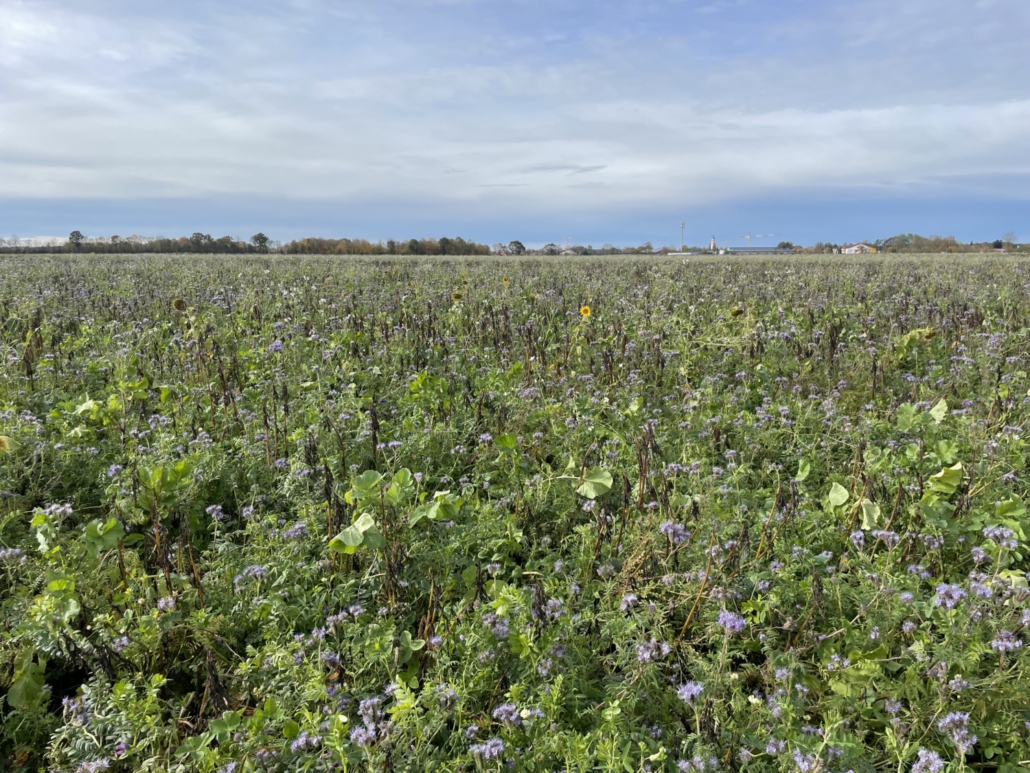
Evergreen Plants
Some plants remain green even in the winter, and some of these are suitable as rabbit food. For example, bamboo (any type of garden bamboo) stays green throughout the winter and can be planted in the garden to feed rabbits during this time. Another example is the blackberry, whose leaves stay green in the winter and are very popular with rabbits.
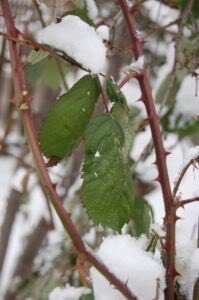
Houseplants
You can also select your houseplants according to what your rabbits like. Some houseplants are safe for rabbits. For instance, I feed papyrus to my rabbits in the winter.
Spring Branches
Most branches are bare and in dormancy during winter. However, if you bring them inside and place them in water, they will start to form buds, and leaves will begin to grow.
Plant Remains
Wild rabbits primarily feed on plant remnants in winter, which they find under the snow. Even in winter, you can still find a variety of plant remains. While they may not look as appealing, these remnants make a delicious feast for rabbits. Foraging in winter is still worthwhile.
Green on the Windowsill
You can grow plants in flowerpots, though the yield will be quite small.
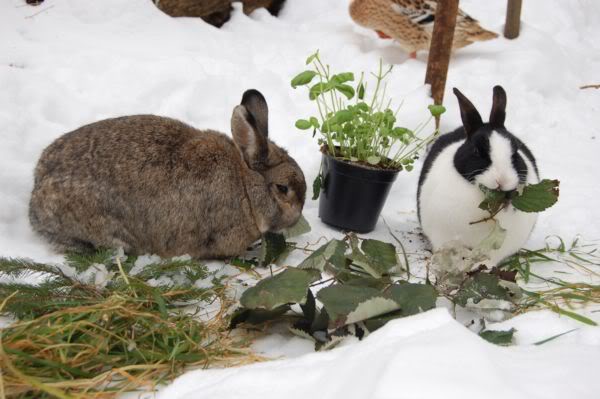
Fresh from the Pet Store
Pet stores sell grasses for small animals (or cat grass), which can be grown in pots. You can also buy Golliwoog, a highly popular plant that rabbits love to eat.
Leafy Vegetables
Supermarkets offer various leafy vegetables that can be used as a basic food source in winter.
Leafy vegetables include all types of lettuce (such as head lettuce, romaine, chicory, endive, arugula), carrot tops, celery, spinach, radish greens, fennel greens, Swiss chard, Jerusalem artichoke plants, beet greens, kohlrabi, broccoli, cauliflower, Chinese cabbage, kale, Romanesco, red cabbage, savoy cabbage, Brussels sprouts, and more.
Vegetables
You can also offer other fresh vegetables as part of their diet.
Herbs
Many stores offer fresh herbs in bunches or pots. All culinary herbs are suitable, and most rabbits love them. Herbs are an important part of a rabbit’s diet.
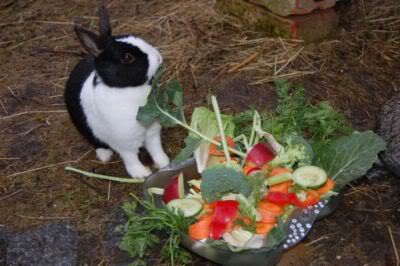
A too high proportion of solid vegetables is not suitable for rabbits. 70% of their diet should consist of leafy greens.


